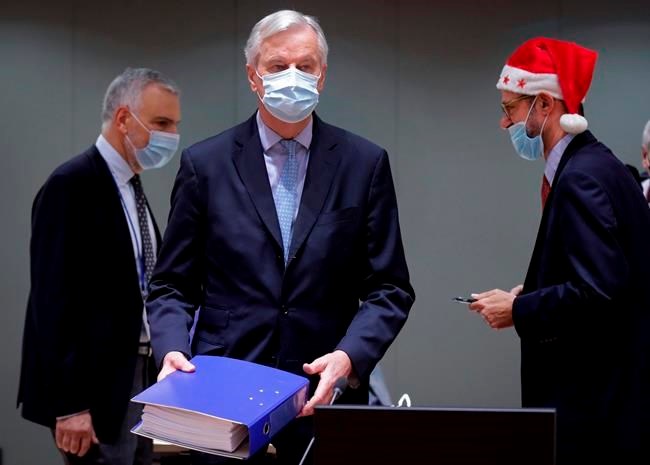LONDON — First came the Brexit trade deal. Now comes the red tape and the institutional nitty gritty.
Four days after sealing a free trade agreement with the European Union, the British government warned businesses Monday to get ready for disruptions and “bumpy moments” when the new rules take effect on Thursday night.
Firms are scrambling to digest the details and implications of the 1,240-page deal sealed by the EU and the U.K. on Christmas Eve, just a week before the year-end deadline.
Ambassadors from the 27 EU nations, meanwhile, gave their unanimous approval to the deal on Monday.
“Green light,” said German spokesman Sebastian Fischer, whose country currently holds the EU presidency..
The approval had been expected, since all EU leaders have warmly welcomed the deal, which is designed to put post-Brexit relations between the bloc and former member Britain on reliable footing.
The agreement has not, however, eliminated the mistrust that festered between Britain and its
The French presidency said in a statement that France would remain “from the very first day very vigilant” about the implementation of the deal, especially to protect French companies and fisheries “in case the U.K. disregards its commitments.”
The agreement needs approval from Britain's Parliament, which is scheduled to vote on it Wednesday, and from the EU’s legislature, which is not expected to take up the deal for weeks. The leaders of the European Parliament’s political groups said they would not seek full approval until March because of the specific and far-reaching implications of the agreement. The overwhelming expectation is that EU lawmakers will approve the deal.
The U.K. left the EU almost a year ago, but remained within the bloc's economic embrace during a transition period that ends at midnight Brussels time -- 11 p.m. in London -- on Dec. 31.
The agreement, hammered out after more than nine months of tense negotiations, will ensure Britain and the 27-nation bloc can continue to trade in goods without tariffs or quotas. That should help protect the 660 billion pounds ($894 billion) in annual trade between the two sides, and the hundreds of thousands of jobs that rely on it.
But the end to Britain’s membership in the EU’s vast single market and customs union will still bring inconvenience and new expense for both individuals and businesses — from the need for tourists to have travel insurance to the millions of new customs declarations that firms will have to fill out.
“I’m sure there will be bumpy moments but we are there in order to try to do everything we can to smooth the path,” Michael Gove, the British Cabinet minister in charge of Brexit preparations, told the BBC.
British Prime Minister Boris Johnson's Conservative government argues that any short-term disruption from Brexit will be worth it, because the U.K. will now be free to set its own rules and strike new trade deals around the world.
Yet an ominous preview of what could happen if U.K.-EU trade faces heavy restrictions came this month when France briefly closed its border with Britain because of a highly transmissible new variant of the coronavirus sweeping through London and southern England. Thousands of trucks were stuck in traffic jams or parked at a disused airfield near the English Channel port of Dover for days and supermarkets warned that some goods, including fresh produce would soon run short.
Even after France relented and agreed to let in truckers who tested negative for the virus, the backlog of 15,000 drivers who now needed tests took days to clear.
Despite the deal, uncertainty hangs over huge chunks of the relationship between Britain and the EU. The agreement covers trade in goods, but leaves the U.K.’s huge financial services sector in limbo, still uncertain how easily it can do business with the bloc after Jan. 1. The British territory of Gibraltar, which sees thousands of workers cross over daily from Spain, is also in limbo since it was not included in the deal.
“This is not a final done deal in many respects,” said Jill Rutter of the U.K. in a Changing Europe
And the deal has angered one sector that the U.K. government vowed to protect: fishing. The economically minor but hugely symbolic issue of fishing rights was a sticking point in negotiations, with maritime EU nations seeking to retain access to U.K. waters, and Britain insisting it must control its seas.
Under the deal, the EU will give up a quarter of the quota it catches in U.K. waters, far less than the 80% Britain initially demanded. The system will be phased in over 5 1/2 years, after which the quotas will be reassessed.
“I am angry, disappointed and betrayed,” said Andrew Locker, chairman of Britain’s National Federation of Fishermen’s Organizations. “Boris Johnson promised us the rights to all the fish that swim in our exclusive economic zone and we have got a fraction of that.”
___
Casert reported from Brussels. Geir Moulson in Berlin and Sylvie Corbet in Paris contributed.
___
Follow all AP stories on the Brexit trade talks at h ttps://apnews.com/Brexit
Jill Lawless And Raf Casert, The Associated Press



